Reflective Journal on Teamwork in Smartsims Simulation
VerifiedAdded on 2020/03/28
|8
|1949
|626
Journal and Reflective Writing
AI Summary
This reflective journal details a student's experience and insights gained from a teamwork simulation using Smartsims. The journal explores the application of Tuckman's stages of team development (forming, storming, norming, and performing) within the context of the simulation. The student reflects on their personal growth, the importance of respect, patience, and tolerance within a team, and the impact of decision-making on outcomes. Key takeaways include lessons learned about leadership, conflict resolution, time management, and the value of diverse perspectives. The journal also highlights the benefits of simulations in developing business skills and preparing students for the practical business world, emphasizing improved self-esteem and confidence. The student concludes by emphasizing the importance of teamwork and the application of these learned skills in future endeavors.
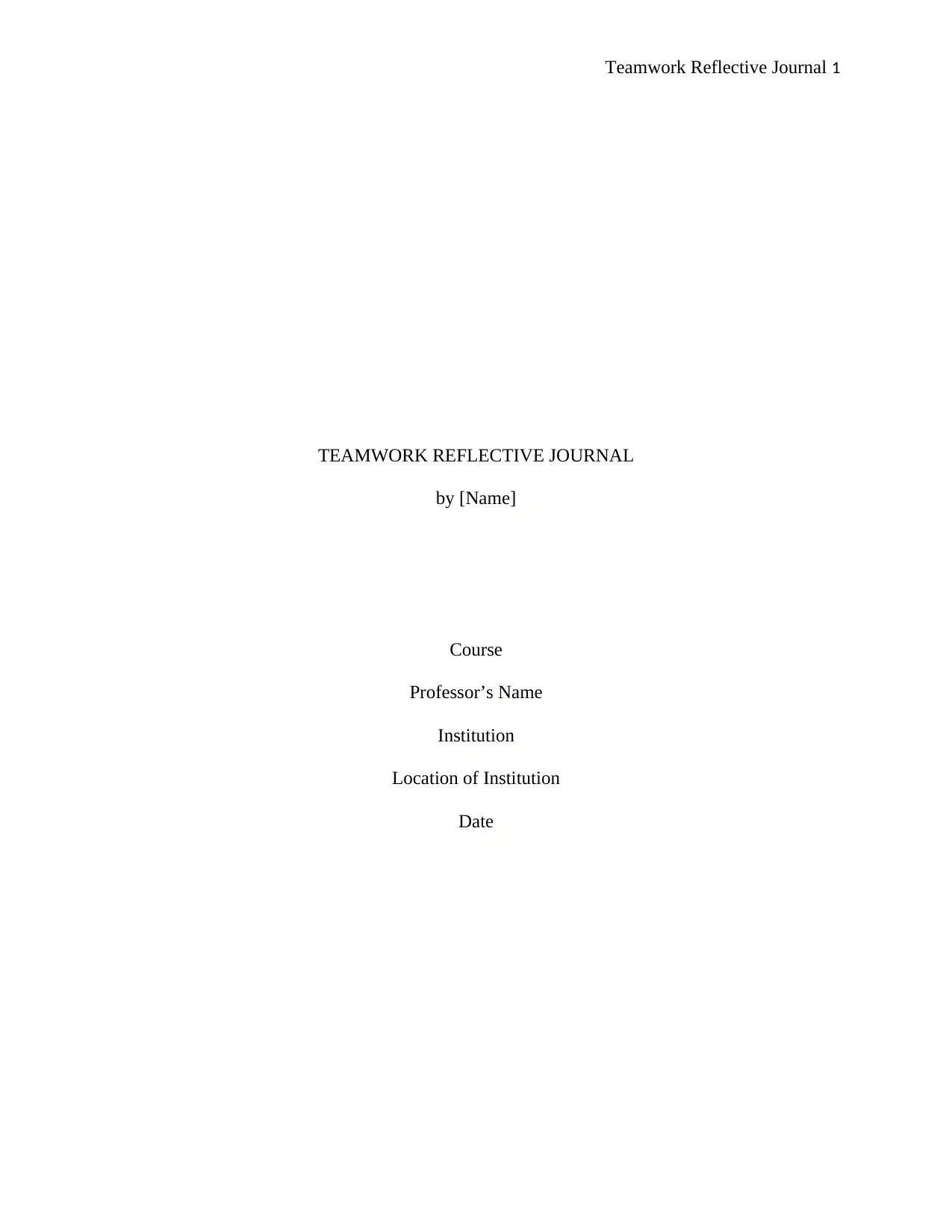
Teamwork Reflective Journal 1
TEAMWORK REFLECTIVE JOURNAL
by [Name]
Course
Professor’s Name
Institution
Location of Institution
Date
TEAMWORK REFLECTIVE JOURNAL
by [Name]
Course
Professor’s Name
Institution
Location of Institution
Date
Paraphrase This Document
Need a fresh take? Get an instant paraphrase of this document with our AI Paraphraser
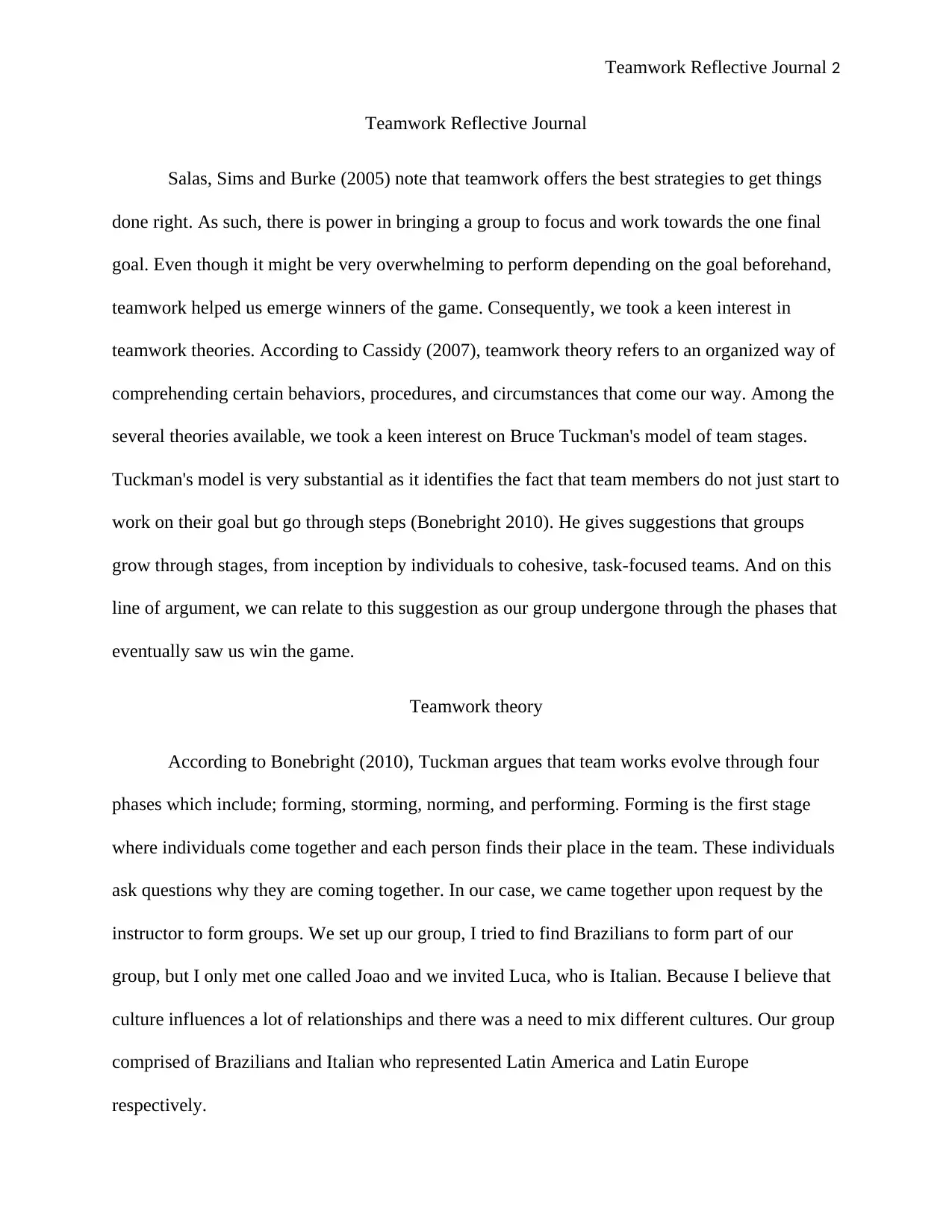
Teamwork Reflective Journal 2
Teamwork Reflective Journal
Salas, Sims and Burke (2005) note that teamwork offers the best strategies to get things
done right. As such, there is power in bringing a group to focus and work towards the one final
goal. Even though it might be very overwhelming to perform depending on the goal beforehand,
teamwork helped us emerge winners of the game. Consequently, we took a keen interest in
teamwork theories. According to Cassidy (2007), teamwork theory refers to an organized way of
comprehending certain behaviors, procedures, and circumstances that come our way. Among the
several theories available, we took a keen interest on Bruce Tuckman's model of team stages.
Tuckman's model is very substantial as it identifies the fact that team members do not just start to
work on their goal but go through steps (Bonebright 2010). He gives suggestions that groups
grow through stages, from inception by individuals to cohesive, task-focused teams. And on this
line of argument, we can relate to this suggestion as our group undergone through the phases that
eventually saw us win the game.
Teamwork theory
According to Bonebright (2010), Tuckman argues that team works evolve through four
phases which include; forming, storming, norming, and performing. Forming is the first stage
where individuals come together and each person finds their place in the team. These individuals
ask questions why they are coming together. In our case, we came together upon request by the
instructor to form groups. We set up our group, I tried to find Brazilians to form part of our
group, but I only met one called Joao and we invited Luca, who is Italian. Because I believe that
culture influences a lot of relationships and there was a need to mix different cultures. Our group
comprised of Brazilians and Italian who represented Latin America and Latin Europe
respectively.
Teamwork Reflective Journal
Salas, Sims and Burke (2005) note that teamwork offers the best strategies to get things
done right. As such, there is power in bringing a group to focus and work towards the one final
goal. Even though it might be very overwhelming to perform depending on the goal beforehand,
teamwork helped us emerge winners of the game. Consequently, we took a keen interest in
teamwork theories. According to Cassidy (2007), teamwork theory refers to an organized way of
comprehending certain behaviors, procedures, and circumstances that come our way. Among the
several theories available, we took a keen interest on Bruce Tuckman's model of team stages.
Tuckman's model is very substantial as it identifies the fact that team members do not just start to
work on their goal but go through steps (Bonebright 2010). He gives suggestions that groups
grow through stages, from inception by individuals to cohesive, task-focused teams. And on this
line of argument, we can relate to this suggestion as our group undergone through the phases that
eventually saw us win the game.
Teamwork theory
According to Bonebright (2010), Tuckman argues that team works evolve through four
phases which include; forming, storming, norming, and performing. Forming is the first stage
where individuals come together and each person finds their place in the team. These individuals
ask questions why they are coming together. In our case, we came together upon request by the
instructor to form groups. We set up our group, I tried to find Brazilians to form part of our
group, but I only met one called Joao and we invited Luca, who is Italian. Because I believe that
culture influences a lot of relationships and there was a need to mix different cultures. Our group
comprised of Brazilians and Italian who represented Latin America and Latin Europe
respectively.

Teamwork Reflective Journal 3
The second phase involves storming, where group members begin to recognize
themselves as part of the group. At this phase, we challenged one another, elected our group
leader, and formulated strategies and roles for everyone in readiness for the game. We named our
company Abacus, a name suggested by Luca. Then we began to analyze the instructions of the
game deeply on the site alongside some tips provided by Rex. In the process, we realized that
Luca easily understood the technicalities of the game and we all followed his orientation. From
then on, we were ahead of our competitors.
The third phase of teamwork entails norming. Every one of us became one, with a single
goal to give our best to the game. We challenged one another on strategies we used in the
competition and adjusted appropriately (Neuman and Wright 1999). Our group leader ensured
that differences, confrontations, and conflicts did not sway our focus on the goal at hand of
winning the game. Luca was very instrumental in ensuring that we remained focused. We
encountered diverging suggestions and it became difficult to reach mutual agreement amongst us
in most instances but eventually our sobriety and tolerance paid off when we settled our
diverging opinions. Every contribution was taken seriously and all of us had the platform to
share different strategies of winning the game. In some circumstances, especially when the
results were negative, I gave my opinion and did not impose. I always let the leader make the
final decision, because he trusted his final word, even though he was very temperamental and it
posed a challenge dealing with that. From this, I learned to respect authority and the leadership
of the group.
And lastly, performing became the focus of the team. We focused on the game and team
relationship, which combined to provide synergy for our overall success (Malec et al. 2007).
The second phase involves storming, where group members begin to recognize
themselves as part of the group. At this phase, we challenged one another, elected our group
leader, and formulated strategies and roles for everyone in readiness for the game. We named our
company Abacus, a name suggested by Luca. Then we began to analyze the instructions of the
game deeply on the site alongside some tips provided by Rex. In the process, we realized that
Luca easily understood the technicalities of the game and we all followed his orientation. From
then on, we were ahead of our competitors.
The third phase of teamwork entails norming. Every one of us became one, with a single
goal to give our best to the game. We challenged one another on strategies we used in the
competition and adjusted appropriately (Neuman and Wright 1999). Our group leader ensured
that differences, confrontations, and conflicts did not sway our focus on the goal at hand of
winning the game. Luca was very instrumental in ensuring that we remained focused. We
encountered diverging suggestions and it became difficult to reach mutual agreement amongst us
in most instances but eventually our sobriety and tolerance paid off when we settled our
diverging opinions. Every contribution was taken seriously and all of us had the platform to
share different strategies of winning the game. In some circumstances, especially when the
results were negative, I gave my opinion and did not impose. I always let the leader make the
final decision, because he trusted his final word, even though he was very temperamental and it
posed a challenge dealing with that. From this, I learned to respect authority and the leadership
of the group.
And lastly, performing became the focus of the team. We focused on the game and team
relationship, which combined to provide synergy for our overall success (Malec et al. 2007).
⊘ This is a preview!⊘
Do you want full access?
Subscribe today to unlock all pages.

Trusted by 1+ million students worldwide

Teamwork Reflective Journal 4
Ultimately, we delivered results by working effectively together as it is the foundation of
Tuckman's theory. The significance of this phase is priceless as it assist individuals appreciate
how teams grow. We were very happy with the first result. Because there was a small difference
between our competitors and us. And this motivated us to start thinking of other strategies to get
ahead of them. The main point was to try and find a better way to combining all the factors so
that the results were bigger than those of our competitors' were.
New insights learned from the game
The main lessons we learned during this game are respect, patience, and tolerance. I
learned more about respect, especially when sometimes I did not agree with the point of view of
a group member or with a decision made (Leonard, Graham and Bonacum 2004). To be more
specific in the year 2016 we were in second place in the mountain segment in the sales category
despite not agreeing with the final decision. Moreover, that decision reflected in our results.
Even though we do not always win, we were also prepared to loose. I got to know that bad
decisions often affect the final outcome of a process.
Nevertheless, personal reflection about Smartsims simulation reality also enabled me to
acquire more skills. It is the best way to approach theory to practice (Crookall 2010). Simulators
like these bring students closer to reality as it prepares participants to the practical business
world. As such, Smartsims simulation enables students to acquire additional skills and
confidence which they put into practice thus provide real results. These simulators contribute in
several areas, such as employability, interaction among students and between students and
teachers, and cooperation between educational institutions and grades (Crookall 2010).
Ultimately, we delivered results by working effectively together as it is the foundation of
Tuckman's theory. The significance of this phase is priceless as it assist individuals appreciate
how teams grow. We were very happy with the first result. Because there was a small difference
between our competitors and us. And this motivated us to start thinking of other strategies to get
ahead of them. The main point was to try and find a better way to combining all the factors so
that the results were bigger than those of our competitors' were.
New insights learned from the game
The main lessons we learned during this game are respect, patience, and tolerance. I
learned more about respect, especially when sometimes I did not agree with the point of view of
a group member or with a decision made (Leonard, Graham and Bonacum 2004). To be more
specific in the year 2016 we were in second place in the mountain segment in the sales category
despite not agreeing with the final decision. Moreover, that decision reflected in our results.
Even though we do not always win, we were also prepared to loose. I got to know that bad
decisions often affect the final outcome of a process.
Nevertheless, personal reflection about Smartsims simulation reality also enabled me to
acquire more skills. It is the best way to approach theory to practice (Crookall 2010). Simulators
like these bring students closer to reality as it prepares participants to the practical business
world. As such, Smartsims simulation enables students to acquire additional skills and
confidence which they put into practice thus provide real results. These simulators contribute in
several areas, such as employability, interaction among students and between students and
teachers, and cooperation between educational institutions and grades (Crookall 2010).
Paraphrase This Document
Need a fresh take? Get an instant paraphrase of this document with our AI Paraphraser

Teamwork Reflective Journal 5
In addition, Beaubien and Baker (2004) observed that simulations help students acquire
experiences, and consequently gain confidence and through that, they succeed in their
professional career. Notably, when students come together and carry out real practical, they
acquire confidence in the profession. Personally, I now feel different, my self-esteem has
improved a lot, courtesy of the simulations. In particular, Smartbikes simulation is a means of
developing users' self-confidence and experience (Crookall 2010). From here, I expect to apply
the experience in nurturing my business skills and create innovative opportunities.
Conclusion
In my opinion, this type of game help people emphasize the importance of teamwork
which include motivating unity in the workplace environment (Van Der Vegt and Bunderson
2005). Of note, working as a team enabled us to understand one another by identifying our
strengths and weakness which ultimately helped us emerge winners. We learned a lot from
contradicting opinion, weighed on them and chose the best strategy which drove us to victory.
Leonard, Graham and Bonacum (2004), observes that teamwork helps improve work efficiency
and productivity. In particular, we shared duties among ourselves where the group leader
assigned us areas that we had more strengths which saw us ultimately win the game. From our
group members, I was able to learn other techniques and acquired skills such as respect,
tolerance, and humility when dealing with different opinions. Lastly, teamwork is very important
as it promotes workplace synergy (Riebe et al. 2010). We could motivate one another when the
going became tough. We endured a team spirit and worked collectively which eventually bore
fruits.
Another strategy involves teaching the students about teamwork skills. Students need
techniques to constructively resolve disagreement among them. Besides, students need advice on
In addition, Beaubien and Baker (2004) observed that simulations help students acquire
experiences, and consequently gain confidence and through that, they succeed in their
professional career. Notably, when students come together and carry out real practical, they
acquire confidence in the profession. Personally, I now feel different, my self-esteem has
improved a lot, courtesy of the simulations. In particular, Smartbikes simulation is a means of
developing users' self-confidence and experience (Crookall 2010). From here, I expect to apply
the experience in nurturing my business skills and create innovative opportunities.
Conclusion
In my opinion, this type of game help people emphasize the importance of teamwork
which include motivating unity in the workplace environment (Van Der Vegt and Bunderson
2005). Of note, working as a team enabled us to understand one another by identifying our
strengths and weakness which ultimately helped us emerge winners. We learned a lot from
contradicting opinion, weighed on them and chose the best strategy which drove us to victory.
Leonard, Graham and Bonacum (2004), observes that teamwork helps improve work efficiency
and productivity. In particular, we shared duties among ourselves where the group leader
assigned us areas that we had more strengths which saw us ultimately win the game. From our
group members, I was able to learn other techniques and acquired skills such as respect,
tolerance, and humility when dealing with different opinions. Lastly, teamwork is very important
as it promotes workplace synergy (Riebe et al. 2010). We could motivate one another when the
going became tough. We endured a team spirit and worked collectively which eventually bore
fruits.
Another strategy involves teaching the students about teamwork skills. Students need
techniques to constructively resolve disagreement among them. Besides, students need advice on
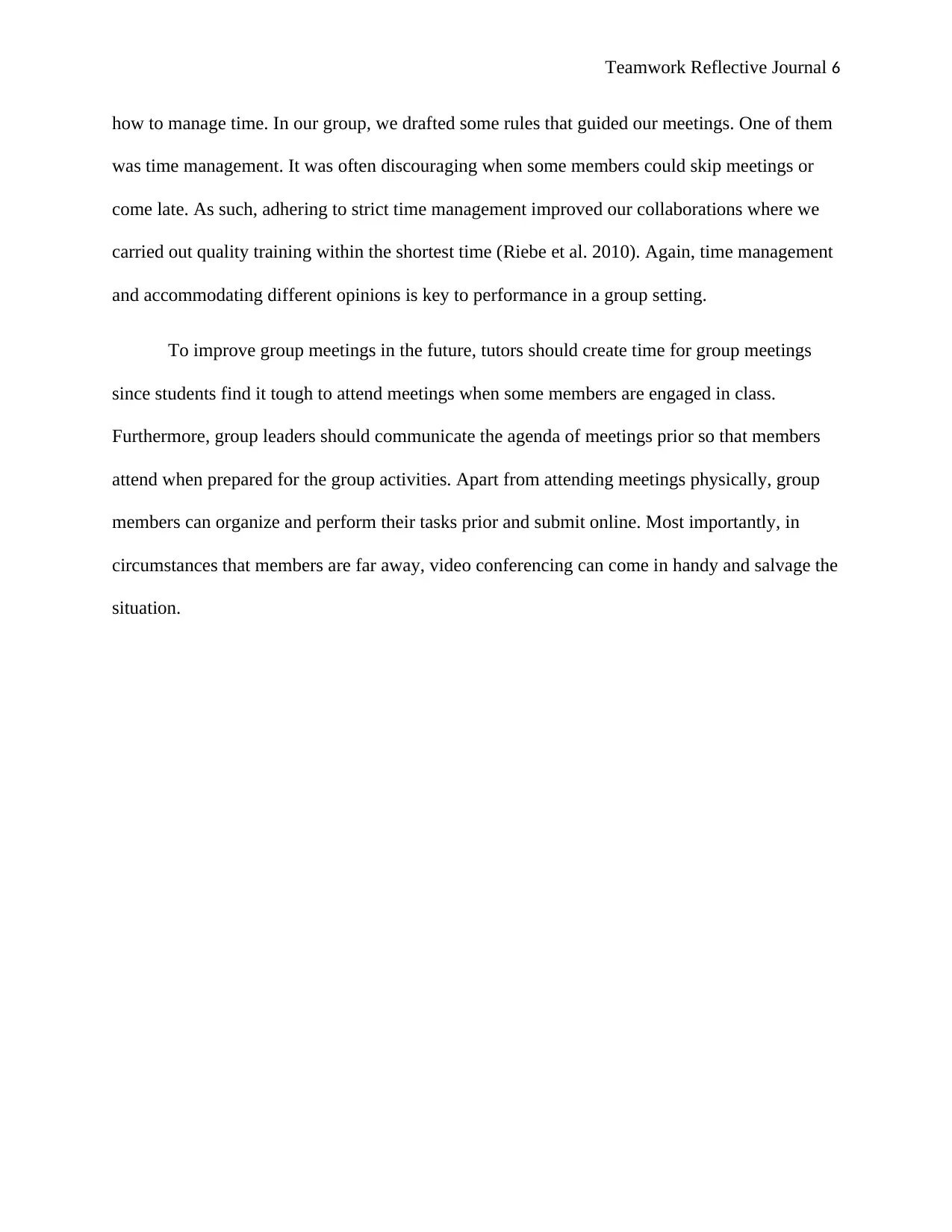
Teamwork Reflective Journal 6
how to manage time. In our group, we drafted some rules that guided our meetings. One of them
was time management. It was often discouraging when some members could skip meetings or
come late. As such, adhering to strict time management improved our collaborations where we
carried out quality training within the shortest time (Riebe et al. 2010). Again, time management
and accommodating different opinions is key to performance in a group setting.
To improve group meetings in the future, tutors should create time for group meetings
since students find it tough to attend meetings when some members are engaged in class.
Furthermore, group leaders should communicate the agenda of meetings prior so that members
attend when prepared for the group activities. Apart from attending meetings physically, group
members can organize and perform their tasks prior and submit online. Most importantly, in
circumstances that members are far away, video conferencing can come in handy and salvage the
situation.
how to manage time. In our group, we drafted some rules that guided our meetings. One of them
was time management. It was often discouraging when some members could skip meetings or
come late. As such, adhering to strict time management improved our collaborations where we
carried out quality training within the shortest time (Riebe et al. 2010). Again, time management
and accommodating different opinions is key to performance in a group setting.
To improve group meetings in the future, tutors should create time for group meetings
since students find it tough to attend meetings when some members are engaged in class.
Furthermore, group leaders should communicate the agenda of meetings prior so that members
attend when prepared for the group activities. Apart from attending meetings physically, group
members can organize and perform their tasks prior and submit online. Most importantly, in
circumstances that members are far away, video conferencing can come in handy and salvage the
situation.
⊘ This is a preview!⊘
Do you want full access?
Subscribe today to unlock all pages.

Trusted by 1+ million students worldwide
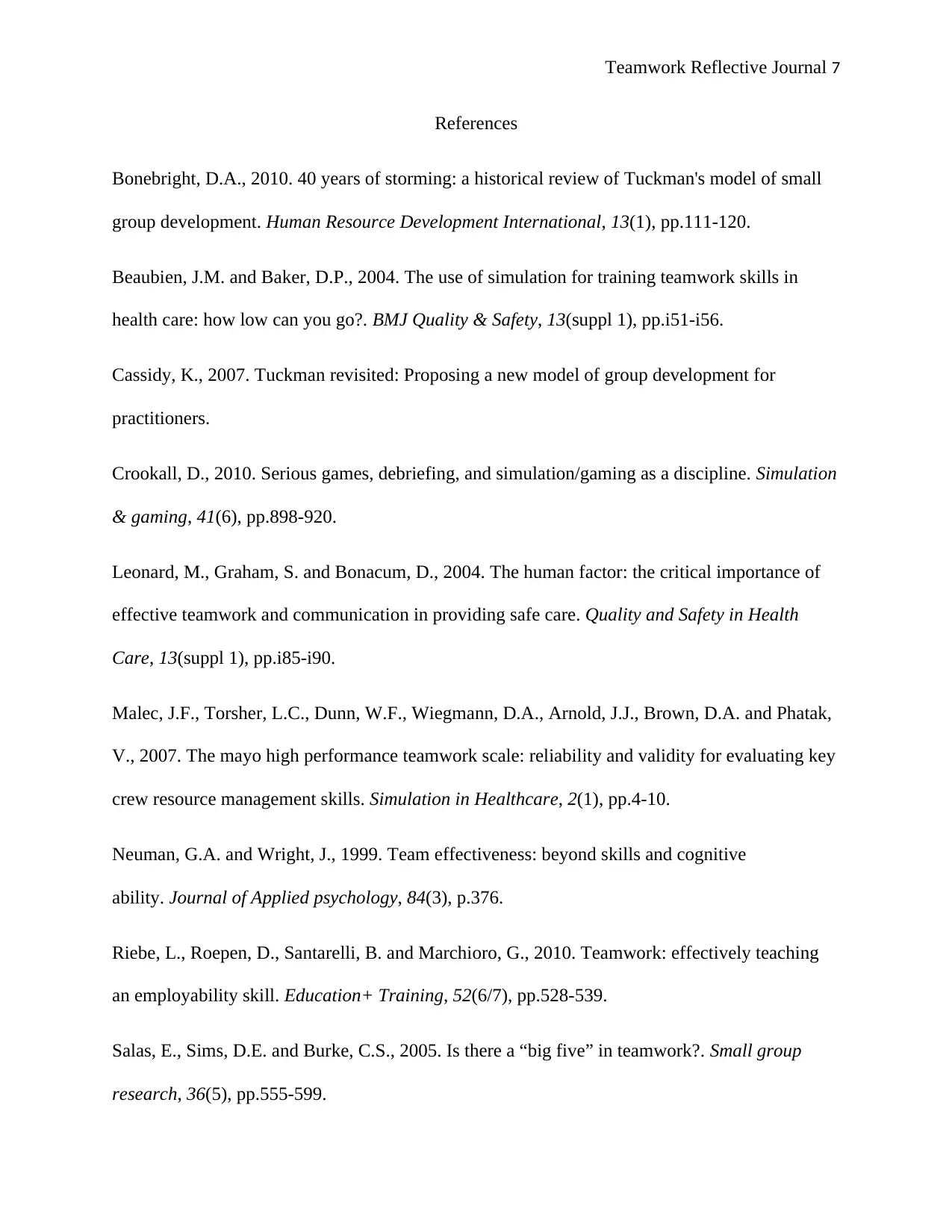
Teamwork Reflective Journal 7
References
Bonebright, D.A., 2010. 40 years of storming: a historical review of Tuckman's model of small
group development. Human Resource Development International, 13(1), pp.111-120.
Beaubien, J.M. and Baker, D.P., 2004. The use of simulation for training teamwork skills in
health care: how low can you go?. BMJ Quality & Safety, 13(suppl 1), pp.i51-i56.
Cassidy, K., 2007. Tuckman revisited: Proposing a new model of group development for
practitioners.
Crookall, D., 2010. Serious games, debriefing, and simulation/gaming as a discipline. Simulation
& gaming, 41(6), pp.898-920.
Leonard, M., Graham, S. and Bonacum, D., 2004. The human factor: the critical importance of
effective teamwork and communication in providing safe care. Quality and Safety in Health
Care, 13(suppl 1), pp.i85-i90.
Malec, J.F., Torsher, L.C., Dunn, W.F., Wiegmann, D.A., Arnold, J.J., Brown, D.A. and Phatak,
V., 2007. The mayo high performance teamwork scale: reliability and validity for evaluating key
crew resource management skills. Simulation in Healthcare, 2(1), pp.4-10.
Neuman, G.A. and Wright, J., 1999. Team effectiveness: beyond skills and cognitive
ability. Journal of Applied psychology, 84(3), p.376.
Riebe, L., Roepen, D., Santarelli, B. and Marchioro, G., 2010. Teamwork: effectively teaching
an employability skill. Education+ Training, 52(6/7), pp.528-539.
Salas, E., Sims, D.E. and Burke, C.S., 2005. Is there a “big five” in teamwork?. Small group
research, 36(5), pp.555-599.
References
Bonebright, D.A., 2010. 40 years of storming: a historical review of Tuckman's model of small
group development. Human Resource Development International, 13(1), pp.111-120.
Beaubien, J.M. and Baker, D.P., 2004. The use of simulation for training teamwork skills in
health care: how low can you go?. BMJ Quality & Safety, 13(suppl 1), pp.i51-i56.
Cassidy, K., 2007. Tuckman revisited: Proposing a new model of group development for
practitioners.
Crookall, D., 2010. Serious games, debriefing, and simulation/gaming as a discipline. Simulation
& gaming, 41(6), pp.898-920.
Leonard, M., Graham, S. and Bonacum, D., 2004. The human factor: the critical importance of
effective teamwork and communication in providing safe care. Quality and Safety in Health
Care, 13(suppl 1), pp.i85-i90.
Malec, J.F., Torsher, L.C., Dunn, W.F., Wiegmann, D.A., Arnold, J.J., Brown, D.A. and Phatak,
V., 2007. The mayo high performance teamwork scale: reliability and validity for evaluating key
crew resource management skills. Simulation in Healthcare, 2(1), pp.4-10.
Neuman, G.A. and Wright, J., 1999. Team effectiveness: beyond skills and cognitive
ability. Journal of Applied psychology, 84(3), p.376.
Riebe, L., Roepen, D., Santarelli, B. and Marchioro, G., 2010. Teamwork: effectively teaching
an employability skill. Education+ Training, 52(6/7), pp.528-539.
Salas, E., Sims, D.E. and Burke, C.S., 2005. Is there a “big five” in teamwork?. Small group
research, 36(5), pp.555-599.
Paraphrase This Document
Need a fresh take? Get an instant paraphrase of this document with our AI Paraphraser
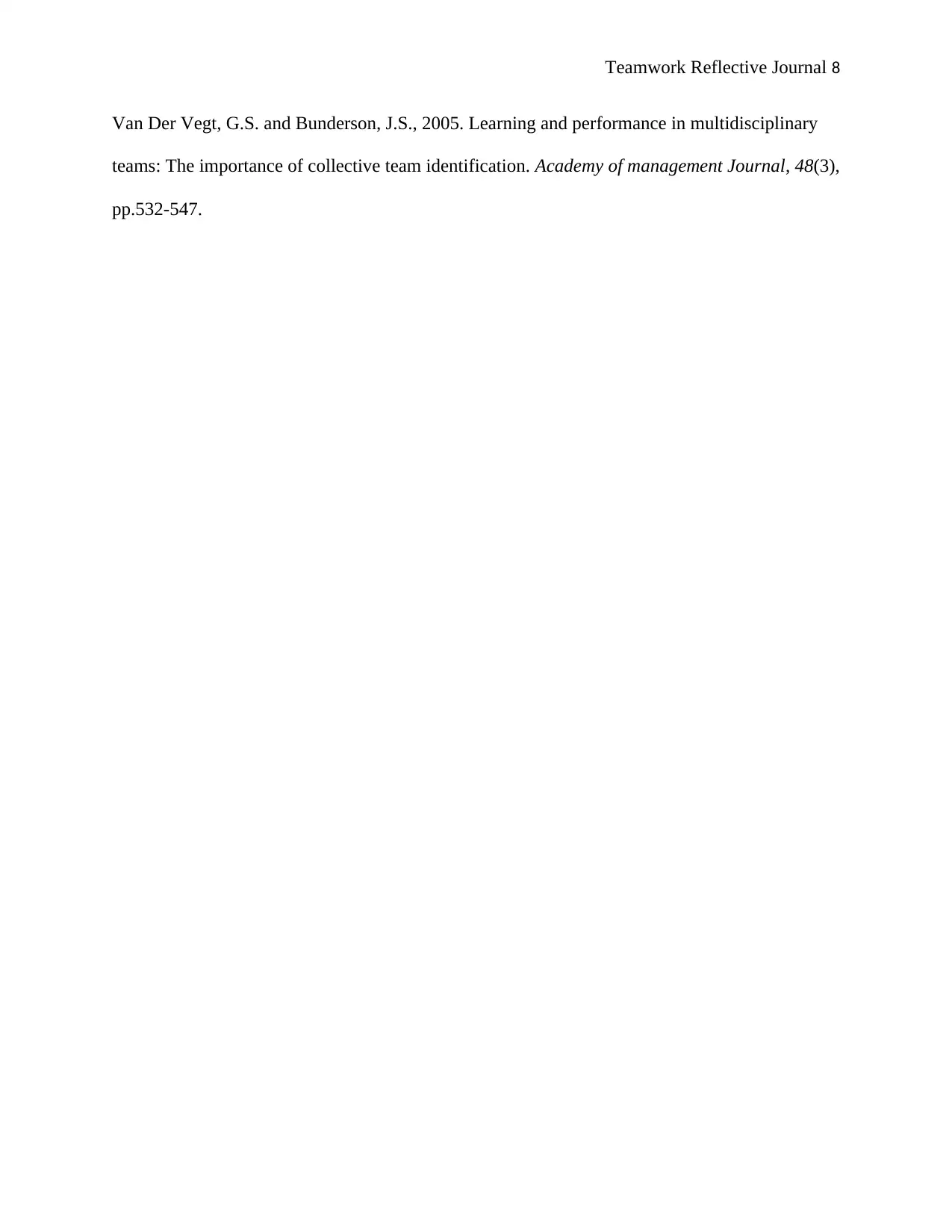
Teamwork Reflective Journal 8
Van Der Vegt, G.S. and Bunderson, J.S., 2005. Learning and performance in multidisciplinary
teams: The importance of collective team identification. Academy of management Journal, 48(3),
pp.532-547.
Van Der Vegt, G.S. and Bunderson, J.S., 2005. Learning and performance in multidisciplinary
teams: The importance of collective team identification. Academy of management Journal, 48(3),
pp.532-547.
1 out of 8
Related Documents
Your All-in-One AI-Powered Toolkit for Academic Success.
+13062052269
info@desklib.com
Available 24*7 on WhatsApp / Email
![[object Object]](/_next/static/media/star-bottom.7253800d.svg)
Unlock your academic potential
Copyright © 2020–2026 A2Z Services. All Rights Reserved. Developed and managed by ZUCOL.




